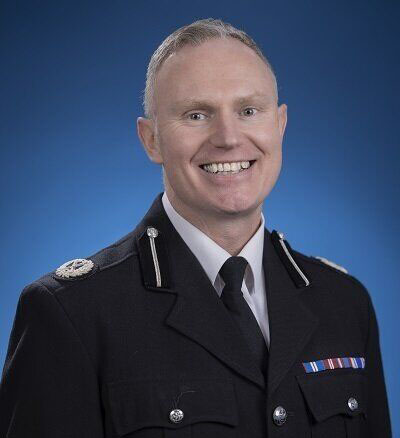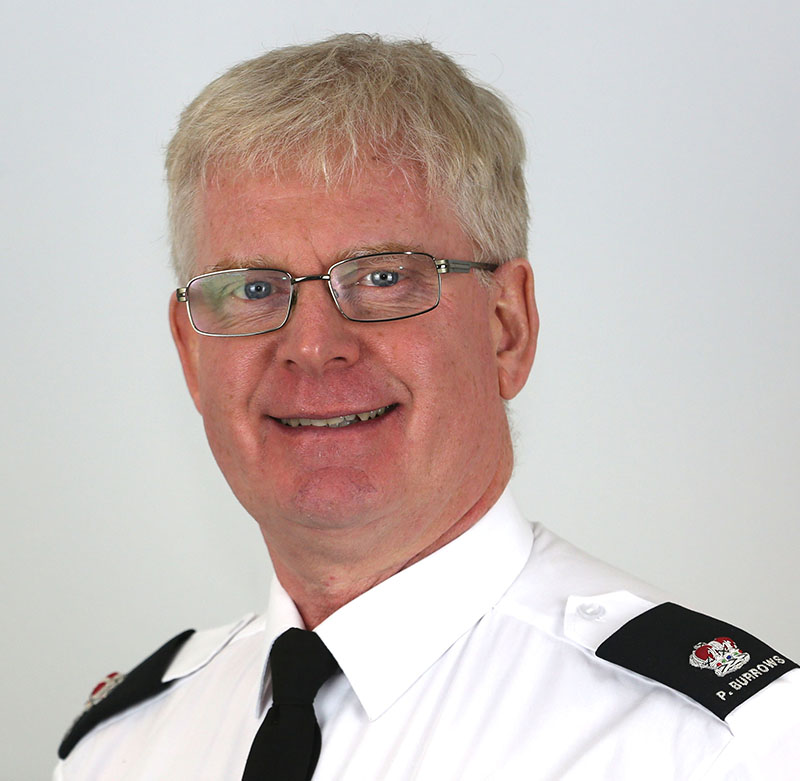by Superintendent Paul Burrows
Disability Lead | Police Superintendents’ Association
In this second blog about my journey through my assessment for autism and ADHD, I’d like to share my experiences of the self-assessment form I’ve had to complete for autism. I am prepared to bet that some of you who read this will be thinking at the end, ‘well that’s me’. I am predicting, ever more confidently, that policing has a significant number of undiagnosed autistics within its ranks, so please don’t be surprised.

A blog about filling forms in? What could be more riveting? If nothing else, it will give an insight into the indicators you may see in yourself or others that would suggest they may be on one spectrum or another. And please don’t sit there thinking, ‘well, everyone’s a little bit autistic’, because they’re not, and saying that is hugely frustrating to those that are; lecture over, sorry.
So, (which I read recently is one of the most-hated ways of starting a sentence), the autism self-assessment form. This is cunningly entitled the ‘AQ-10 Adult’ – I believe this means Autism Question 10! There are 10 questions surprisingly.
Because there are 10 questions, I feel compelled to cover all 10 questions, in order. A precis is not good enough. Perhaps that is evidence in and of itself of my being autistic?
Question 1: Do I notice small sounds when others don’t? Well, when chairing a meeting recently I because obsessed with a clicking noise in the room that no one else seemed to notice, until I pointed it out. At which point everyone seemed to get obsessed with it. I do find background noise hugely frustrating. Please don’t get me onto the subject of music in shops – particularly supermarkets. I mean, WHY? Who chooses the drivel that gets played and why is it so loud?
I recently Googled what music autistic people seemed to prefer – I found one answer that was classical and rock. Well, that’s me down to a tee, so more soothing heavy rock music in supermarkets please, and see what everyone else has to say about it! I’d also ask that you now look out for the ‘autism-friendly’ quiet hours in supermarkets. Wednesday and Saturday 9-10am is one offer. Whilst it’s better than nothing, clearly autistic people don’t want to have a lie in, if indeed they are lucky enough to have a job. The job market can often by a hostile and difficult place for those who are neurodivergent (ND).
Question 2: Do I focus on the big or small picture? Well, that’s an interesting one. I can see big picture and critical path as well as anyone, but only through my focus on the specific details. This is another ND trait: seeing questions from multiple directions. I have found myself frustrating people over the years as I triangulate information with highly detailed questions, testing in my mind whether the big picture strategy will work. I also make movies in my head. So, when I am commanding a public order operation during the planning process, I play the ‘video’ in my head of what is going to happen. Any scenes that are fuzzy or missing need some directing. So, no specific one way or the other answer for me. My ongoing frustration is that many people like me don’t have their skills fully utilised at work. I would ask anyone reading this blog to reflect upon the thorny big picture issues they are dealing with, and seek a neurodivergent approach to tackling the problem – I’m prepared to bet you’ll be surprised by the result and the simplicity of it.
Question 3: Can I multi-task? Definitely not. How people watch TV, read and knit at the same time is completely beyond my understanding. Well in fairness I have never understood knitting patterns, unlike Dumbledore, so knitting alone confuses me. What I can bring however is hyper-focus to a task. Once I get lost in a task, which can take a while if I’m distracted by noise or light, I can emerge hours later in what seems to me to be the blink of an eye.
Feeding off my answer to that question, Question 4 asks how quickly I can return to a task if interrupted. I practice MBWA, Management By Walking About. I just thought that was how I liked to do things, it never occurred to me it might be because I might have ADHD and find it impossible to sit still. Consequently, if distracted, I will usually find something I need to do that involves me walking somewhere to burn off the mental energy to return to task. I am also a big unit as they say, so when I turn up to someone’s desk asking a question, I can be quite hard to ignore. It seems to be an efficient way of doing business when otherwise I would be awaiting a return email that may take days or weeks to arrive. So, I get business done quickly.
I also find myself looking at new emails rather than focussing on the one I’m working on, and this can be distracting. This means that no, I can’t return to task easily. I soon learned to turn off the sound notification of a new email arriving, and that increased my efficiency significantly.
Question 5: Can I easily read between the lines when someone is talking to me? Quite simply – no. I am quite straightforward if someone says something to me, I don’t look for ulterior motive, I don’t communicate like that. I don’t hint – I ask for what I want or say what I mean. Why should others be opaque? I don’t know if this makes me a poor judge of character. This is something I have considered a lot. But knowing others talk differently to me, I do use up a lot of mental energy and lose sleep wondering if there is a hidden meaning in what they are saying to me that I just can’t see or hear. ‘What you see is what you get’ is a saying that reflects me well. Though having said that, I continually mask my true self for fear of my directness upsetting people.
Question 6: Can I tell whether people I’m talking to are getting bored? My issue in answering this question is that I must answer it unmasked, rather than as I would in my normal operating mode. Let’s face it, I have a very low boredom threshold listening to myself talk; my automatic presumption is that anyone I talk to is going to lose interest pretty quickly. So even if they aren’t bored, I think they are. This is a very negative way of thinking I know, but one borne out of years of criticism of the way I communicate.
Consequently, I tend to give pertinent information in short, sharp sound bites that I think will impart all relevant information. I have been accused of holding personal phone calls like a business meeting, and I have all but taken minutes in some of them and asked for AOB. Soft communication that one would expect in a social environment is a real challenge.
The trouble with my staccato communication is it doesn’t always hit the mark, so I have to revisit what I say – there is a huge difference for me in actually boring people and thinking I am boring people. As my working presumption is that most people are bored, I tend not to have learned the cues of whether this is actually the case. I hope that makes sense. The trouble is after years of negative feedback it can sometimes be easier to get the self-defence strike in first, but on myself rather than others. You might think all of this strange, but I will bet that if you spoke to many autistic people, they will reflect a similar view based upon the feedback they have had.
Question 7 particularly tickled me. It is, ‘whether when I’m reading a story, can I work out the characters’ intentions’. Well, this does rather pre-suppose I read fiction. I seem to recall reading an Enid Blyton Famous Five novel around the age of eight; half a century to recall character intentions is a bit of a challenge. I am presently reading through Winston Churchill’s six volume history of World War II, where some of the characters’ intentions were all too painfully apparent, so do I say yes I do, or no I don’t? It’s hard to put caveats to questions that don’t apply.
Question 8: Do I collect information categories – for example, cars, birds, trains or plants? No not really, I have never been one for lining things up in various orders, or re-learning the engine capacities of motorbikes. However, trying to put my CD and DVD collection in order does give me a huge headache. Is it by colour of sleeves which looks prettiest, genre of music/film or alphabetical? To be honest, I find such decisions too stressful to make, so I give a half-hearted attempt to put them in some order, then throw the rest on the shelf because I don’t know whether AC/DC are now rock or metal. This means I always struggle to find what I’m looking for as the filing system doesn’t make sense! It’s like museums – I can’t go into them anymore. The overload of information is so great I have two choices: read everything or read nothing. Nothing it is. I sit outside.
Question 9: Can I work out what someone is thinking or feeling by looking at their face? At the extremes of human emotion – happiness and grief – then yes. The huge gulf between – largely no. I often refer to Sheldon Cooper in the Big Bang Theory TV programme. Whilst not on the same scale as him, I do empathise with his problems reading people.
Finally, Question 10: whether I find it difficult to work out people’s intentions. Yes, really the same as my answer above. Life would be so much easier if people said what they meant, politely but directly.
That is the AQ-10 finished. The list of questions may be of some help to those who have no knowledge of autism assessment and may trigger some thoughts about yourself or friends or family. Please remember my observations are purely personal and are intended to give some insight into the way I think. It will be down to the assessors to decide at some point whether this makes me autistic or not. I will of course share the next stage of my journey and hope this remains helpful for anyone looking to learn more about neurodivergent conditions and their impact on so many. ∎
This blog was originally published on the PSA website – it is reproduced here with kind permission of the author


